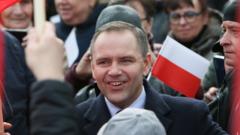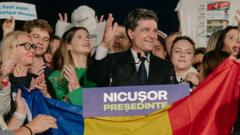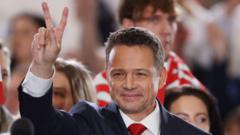A recent controversy has erupted surrounding Karol Nawrocki, a prominent Polish presidential candidate, who has drawn ridicule for masquerading as a fictional author to promote his work.
Poland's Presidential Candidate Mocked for Disguised Self-Promotion

Poland's Presidential Candidate Mocked for Disguised Self-Promotion
Karol Nawrocki faces backlash after revealing he once disguised himself to endorse his own book on TV.
In an unusual twist in the Polish presidential race, candidate Karol Nawrocki has found himself at the center of a social media storm after it surfaced that he previously donned a disguise to extol a book he penned under the pseudonym Tadeusz Batyr. The book, which chronicles the life of a gangster in 1980s communist Poland, has come under scrutiny, raising questions about the integrity of his candidacy.
The revelation came to light via a 2018 television appearance where Nawrocki, altered to appear as Batyr, lauded his writing, claiming, "This historian [Karol Nawrocki] actually really inspired me… the first person to examine organized crime in communist Poland." Adding an extra layer of embarrassment, a social media post from Nawrocki cited a meeting with the fictional Batyr, where he claimed to have provided guidance for the so-called author’s book, further blurring the lines between his dual identities.
The response on Polish social media has been swift, with many users humorously questioning whether they would see Batyr or Nawrocki in the election campaign. When pressed about the backlash, Nawrocki defended his actions, pointing out that literary pseudonyms are common within academia. Yet, he also noted, “[Tadeusz Batyr] had no academic research or sources to refer to,” inadvertently highlighting the absurdity of his situation.
Polls indicate Nawrocki is currently trailing behind Warsaw’s mayor, Rafal Trzaskowski of the liberal Civic Coalition party, while far-right candidate Slawomir Mentzen is gaining traction with his proposals of low taxes and an anti-immigration stance. As the election nears, Nawrocki’s past is haunted by his ties to organized crime figures, though he insists these connections are purely professional.
Looking at the political landscape, the election's stakes reach beyond Poland’s borders, as the country plays a significant role in supporting Ukraine amidst ongoing conflicts. With nearly all military aid to Ukraine routed through Polish territory and 10,000 US troops stationed there, any shifts in leadership could influence broader geopolitical dynamics. Notably, Nawrocki has criticized European leaders for igniting tensions in Ukraine, while his party, Law and Justice (PiS), regularly denounces EU interference.
Political analyst Marcin Zaborowski highlights the importance of this election. Pro-European candidate Trzaskowski, if victorious, could drive a foreign policy continuity favoring integration and support for Ukraine. Simultaneously, shifting domestic policies around abortion access and same-sex marriage hinge on the outcome, as the current president holds veto authority over progress in these areas.
As the campaign accelerates, Nawrocki is determined to shake off the shadows of Tadeusz Batyr and become the clear choice for voters, amid a tight race that could reshape both national and international agendas. With less than two months until the polls open, the attention remains sharply focused on whether Nawrocki can recover from the whimsical fallout of his unmasking.


















